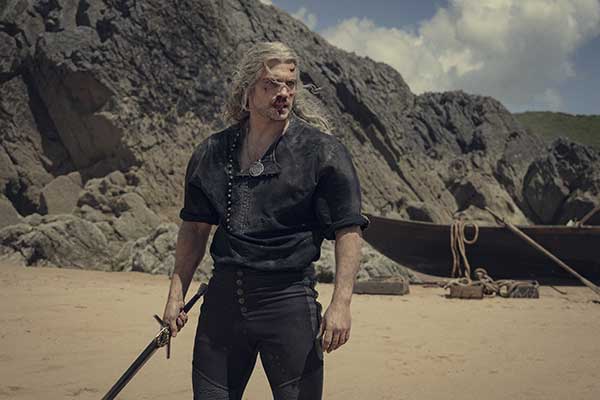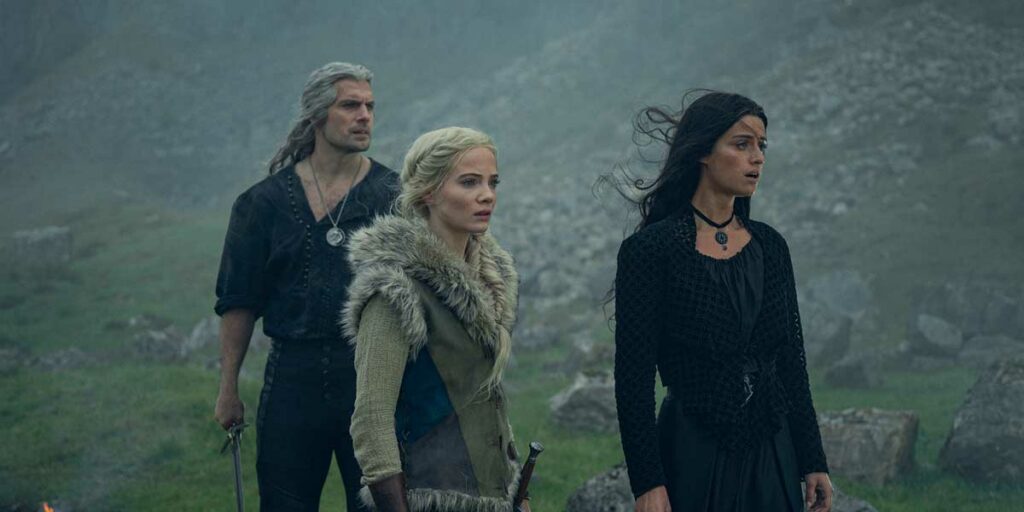The Witcher season 3 vol. 2 is an awkward finale to the fantasy series’ third entry. The highs are mighty high, but the lows leave a lot to be desired.
The first half of The Witcher season 3 left us off with new character alliances and complicated relationships. Emperor Emhyr (Bart Edwards, The Flatshare) brings Francesca Findabair (Mecia Simson, Brave New World) into his forces in an attempt to take over the Northern Kingdoms of the Continent. Geralt (Henry Cavill, Enola Holmes 2) and Yennefer (Anya Chalotra, The Cipher) amend their rocky history, while uncovering a possible traitor within the Brotherhood of Sorcerers. Meanwhile in Redania, Dijkstra (Graham McTavish, House of the Dragon) and Philippa Eilhart (Cassie Clare, The Sandman) are plotting a similar tactic as Geralt and Yen, but with more mischievous motivations. Spoilers for The Witcher season 3 vol. 2….
Having seen the complete arc that The Witcher season 3 was going for, the show’s latest installment continues to feel rushed, though we can’t fully blame it solely on season 3. It’s weird. On one hand, twists that are revealed early in vol. 2 are cool on paper and make for fascinating back and forth between key players. On the other hand, you can’t help but feel a disconnect, not between storylines and characters but between you as a viewer and the series’ turn of events. This issue comes as a result of the Netflix adaptation perhaps failing to make us care for characters not named Ciri (Freya Allan, Gunpowder Milkshake), Geralt, or Yennefer.
In order to drive this point home, we need to talk about important moments that happen early in vol. 2. Vilgefortz (Mahesh Jadu, Marco Polo) is revealed to have been working with Emphyr all along, betraying the sorcerers and sorceresses, including his lover Tissaia de Vries (MyAnna Buring, 97 Minutes). In theory, this should hit you like a bus – which is precisely what characters like Tissaia are feeling – after spending several seasons with Vilgefortz being a “good guy.” Sure thing, he’s been framed in the past as a morally ambiguous individual whose motivations were never fully clear. That still doesn’t excuse not emoting at all once the reveal happens.
For what it’s worth, though, Jadu is not the problem. He plays the part very well and seems to be having more fun playing the villainous side of Vilgefortz than its counterpart. There even is a line referring to the character’s frustration of holding back all along, almost as a reference to Jadu finally being free to have fun with the role. Another factor that works about the twist is the rivalry that’s born between Geralt and Vilgefortz that culminates in a major fight. Cavill and Jadu make you forget their characters have rarely interacted in the show because their dynamic is instantly gripping.

What isn’t nearly as gripping is the dilemma with Tissaia and Vilgefortz. Perhaps this is the case because season 2 didn’t properly build their relationship, so anytime we cut back to them it always felt like filler, rather something we should be invested in. At some point during the big twist, a bunch of sorcerers and sorceresses find themselves being held captive by Dijkstra and Philippa. Characters’ motivations become muddled, you forget who is on whose side, and it quickly becomes apparent that you don’t really care.
Aretuza – the magical academy where sorceresses go to learn to use their chaos – is destroyed as a result of Vilgefortz’s betrayal, as he allows the Scoia’tael attack the fortress led by Francesca and Cahir (Eamon Farren, The Dig). It’s a location with which we should have some sort of emotional connection, since it’s where Yen became who she is now, and yet it gets little to no real reaction. It just happens, and like yourself watching it unfold, the show moves on to far more intriguing things.
But even when The Witcher does move to more exciting storylines – Rience (Sam Woolf, The Crown), a villain our heroes have been dealing with for almost two seasons – they’re dealt with rather quickly, giving you very little time to acknowledge if you’re satisfied with the resolutions or not. In another instance, Cahir is discovered to have been playing both Emphyr and Geralt’s group’s side, as he declares his fealty to Ciri and swears to protect her. Not only does this come with little to no set up – this could have actually been a nice arc to follow – but there’s no conclusion and it ends on a dissatisfying cliffhanger.
Vol. 2 of The Witcher season 3 isn’t all bad or complete disappointment, though. The fantasy series recaptures some of the show’s heart when we see characters face the consequences of their actions and those around them. After his vicious fight with Vilgefortz, Geralt is injured greatly to the verge of death. This allows Henry Cavill to showcase vulnerability in a way we haven’t fully seen in Geralt before. The sense of failure, pain, regret, it all washes over him in an overwhelming rush of emotions, and you feel each and every single one of them.
Jaskier (Joey Batey, Knightfall), who is having his own issues after being betrayed by Prince Radovid (Hugh Skinner, The Invitation) despite falling in love, finds Geralt in the care of Dryads from the Brokilon forest. Here, we’re introduced to Milva (Meng’er Zhang, Shang-Chi and the Ten Rings), a rare human warrior accepted by the Dryads. She, alongside the Dryads, is helping Geralt in his healing. An interesting thematic throughline is sparked from these three’s arcs. Their struggles of failure, feeling lost, yet determination to keep going parallel each other very well.
On a different note, it’s touching to see Yen have come so far. From being an unloved young woman who people viewed as a monster to her becoming self-reliant, yet self-centered in order to protect herself from being hurt again, and finally allowing people into her heart like Ciri and Geralt. Yen’s arc and family dynamic with those two wouldn’t be as strong if we didn’t buy her bond with Tissaia. Yennefer’s daughterly relationship with Tissaia is also far more fascinating than the one Tissaia had with Vilgefortz.
There is genuine affection there that mirrors the love Yen grows to have for Ciri. It all culminates in a tragic end for Yennefer, where not only does she lose her mother figure – as a result of the coup in Aretuza that destroyed the brotherhood, Tissaia kills herself – but she gets separated from both Ciri and Geralt, all three ending where they began, alone trying to find their way back to each other.
Speaking of being alone, Ciri’s journey takes a turn that might spice things up for her storyline moving forward. After opening some kind of portal that sends her to an unknown region, separating herself from her parental figures, Ciri is seen in a desert. No more training sessions with Geralt or Yen, now it’s time to put what she’s picked up to the test.
Surviving monsters, intense heat, and severe hunger, she falls in the hands of a captor in some kind of inn where she’s freed by a gang of criminals simply known as the rats. Here is where Ciri proves her worth, kills her captor, and sets up an interesting arc that may or may not take her down a dark path, as she’s encouraged to keep fighting by a member of the rats, Mistle (Christelle Elwin, Death in Paradise).
The Witcher season 3 vol. 2, like vol. 1, is a bit all over the place. Certain story arcs are definitely more interesting than others. Character motivations aren’t always clear, or they are but you simply don’t care about them. Big events and twists think they’re more grand and epic than they actually are. Yet, why keep coming back? Why be partially engaged? The Witcher, at its core, is a family story, and that tale is what keeps making us come back. Ciri, Geralt, and Yennefer’s connection is so strong and relatable, you continue to root for their journeys against all odds, both in and out of the show’s narrative. Which makes it even more frightening to think a show that struggles with investing you in different characters is about to replace its main actor halfway through its run.
It’s almost poetic that Henry Cavill’s last appearance as Geralt of Rivia is him standing up for what’s right and defending the innocent. For three seasons we’ve been told, just as the character has been told, that Geralt has no humanity. That he can’t help but stay neutral and refuse to take a side in the bigger picture of things. Truth be told, Geralt is sort of a knight at heart. He does care for the well being of others, because that’s the right thing to do. Not taking sides, but helping the innocent. The Witcher season 3 vol. 2’s final shot is Geralt, Jaskier, and Milva walking into the sunset after having saved innocent lives. If that’s the last memory of Cavill’s Geralt for the audience to take away, then what a spectacular run. A run that is worthy of tossing a coin to Cavill’s witcher.
The Witcher Season 3 Vol. 2 is now available to watch on Netflix.

